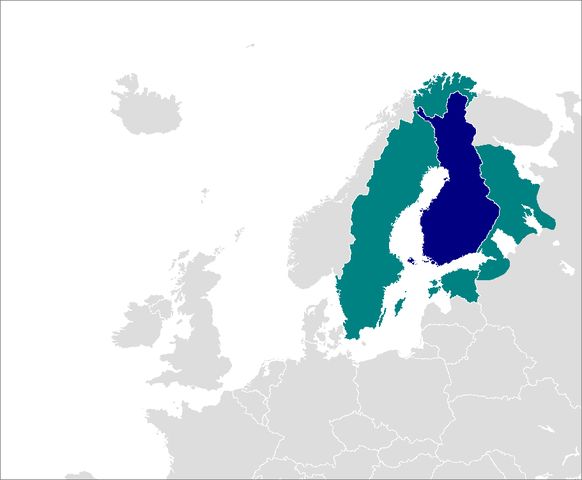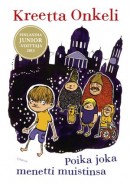Search results for "2010/02/let-us-eat-cake"
Midwinter in a minor key
23 December 2009 | Letter from the Editors
Finland’s end-of-year celebrations, both Christmas and New Year, take place in a thoroughly muted mode. At noon on Christmas Eve the Christmas Peace is rung out from the mediaeval cathedral in Turku, with the pious and seldom realised hope that peace and harmony will be unbroken for the following twelve days.
It’s true, though, that there’s little of the carousing that characterises Christmas celebrations further south; by and large, people stay behind closed doors, and there’s plenty of time, in the dark mornings and evenings and the brief twilight between them, to eat and drink and sleep – and, for those whose souls are not entirely claimed by the television and food-induced torpor, to read. More…
Child of chaos
10 September 2010 | Comics, Fiction
A cornucopia of exciting plots and strange characters, the mythic epic Kalevala has inspired innumerable artists since its first publication in the 1830s. A recent interpretation of the story of an extremely tragic hero named Kullervo takes the form of a graphic novel by Gene Kurkijärvi: his urban Kullervo lives in a grim environment – not unlike Helsinki, but carrying with dystopian overtones – where the heroes and/or villains are steely androids and hairy weirdos who shoot drugs and use foul language. This 21st-century Kullervo is a surrealist cyberpunk tragedy – laced with pitch-black comedy.
Extracts from the graphic novel Kullervo by Gene Kurkijärvi (Like, 2009; captions translated by Owen Witesman) More…
Kullervo: to be, or not?
10 September 2010 | Articles, Non-fiction
A young man is born a slave under stars that augur ill for him. He is maltreated and betrayed from birth. He cannot control his physical power, his aggression or his thirst for revenge and, finally, after fatal errors and deliberate acts of violence, his remaining desire is to die. What, in the end, did life hold for him?
The cruelly tragic story of Kullervo in the Kalevala was largely the creation of the national epic’s compiler, Elias Lönnrot (1802–1884), who put together a number of originally unconnected folk-epic fragments collected in disparate localities throughout the north and east of Finland. This process involved many stages and went on for decades. The first version was published in 1835; for a shorter version for schools in 1862 Lönnrot cut the most violent and erotic scenes – including those involving Kullervo and his sister in an incestuous encounter. More…
In the Metro
31 December 1995 | Archives online, Fiction, Prose
Extract from the collection of short stories Tidig tvekan (‘Early doubt’, 1938). Introduction by David McDuff
– Mademoiselle! You’re late this evening. Was there overtime again? I’ve put a newspaper aside for you. I saw you were in such a hurry in the morning that you didn’t have time to take it. The fashion page is in today, so I thought you’d like to see it. There’s nothing to thank me for, nothing at all. You see, I seem to have got a bit of a secret liking for you. One gradually learns to pick out all the people who come this way in the morning and go back again at night. And you, you see, I noticed you right from the very first day. You looked so frightened, and then you always smiled at me in such a friendly way. I got the idea that you were someone who wasn’t at home here and who was possibly using the underground in the morning rush hour for the first time. More…
Do you speak my language?
23 August 2012 | Articles, Non-fiction

Finnish spoken outside Finland: Sweden (west), Estonia (south), Karelia/Russia (east), Norway (north). Illustration: Zakuragi/Wikipedia
Finland has two official languages, Finnish and Swedish. Approximately five per cent of the population (290,000 Finns) speak Swedish as their native language. All Finns learn both languages at school, and students in higher education must prove they have an adequate knowledge of the other mother tongue. But how do native speakers of Finnish cope with what is, for many of them, a minority language that they will never need or even wish to use? We take a look at bilingual issues – and a new book devoted to them
‘In many parts of the world, language can be a fiery and divisive issue, one that pits the powerless against the powerful, the small against the big. The Basques battle the Spanish. The Flemish tussle with the Walloons. The Québécois scuffle with the rest of Canada.’
That is how Lizette Alvarez illustrated her theme in her article ‘Finland Makes Its Swedes Feel at Home’, published in the New York Times in 2005.
In Finland, language has been a fiery issue at times, though things have cooled down a bit since the early 20th century. The use of Finnish as a written language dates back to the 16th century, but the territory of Finland was part of the Swedish Empire until 1809. Swedish was spoken by the nobility as well as most of the peasant class – the mechanism of the state did not serve Finnish-speaking peasants or other segments of the population in Finnish. More…
Kreetta Onkeli: Poika joka menetti muistinsa [The boy who lost his memory]
9 January 2014 | Mini reviews, Reviews
 Poika joka menetti muistinsa
Poika joka menetti muistinsa
[The boy who lost his memory]
Helsinki: Otava, 2013. 111 pp.
ISBN 978-951-1-27022-5
€22.90, hardback
Kreetta Onkeli, better known for her books for adults, was awarded the 2013 Finlandia Junior award for this book. Arto is a schoolboy who loses his memory, but goes off in search of himself with an open mind. He meets a number of people who are outsiders in various ways and learns important lessons from each of them. Onkeli portrays a child of around 11 to 13 who is confused by many things. Researchers consider this age group to fall into an in-between area: there aren’t enough appealing activities on offer for kids of this age, who are treated as an awkward bunch both at home and at school. This book contains some rule-breakers: the boys eat at a restaurant buffet without paying and ride the subway without a ticket while other characters hint at forging official documents. Adult readers with their eyes closed to reality might consider Arto’s odyssey an anxiety-inducing vision of the future, in which grown-ups are not shown in a flattering light. Children, however, will get wrapped up in this absurd adventure.
Translated by Ruth Urbom
The house the seniors built
27 November 2009 | Reviews

Yours and mine: the common dining room at Sprint
Maija Dahlström – Sirkka Minkkinen
Loppukiri. Vaihtoehtoista asumista seniori-iässä
[Sprint: alternative living for seniors]
Helsinki: WSOY, 2009. 232 p., ill.
ISBN 978-9510-4322-9
€ 32.90, paperback
‘Your elderly mother just told you she fell in the bathroom last night at 4 a.m. Now what?’ advertises the Visiting Nurse Service of New York in the New York Times. Aging people and their desire to live in their own homes is a pressing question around the world. People feel concern over their own living arrangements and those of their loved ones. Living arrangements somewhere between being in one’s own home or in a care facility are sought by many, but there are few of these options available. More…
The winter’s tale
15 March 2010 | This 'n' that
 It’s coming to an end now, but Helsinki has been experiencing its snowiest winter since the 1970s. Since Christmas the mercury has generally stayed ten to twenty degrees below zero.
It’s coming to an end now, but Helsinki has been experiencing its snowiest winter since the 1970s. Since Christmas the mercury has generally stayed ten to twenty degrees below zero.
People have long been complaining about the black ‘Euro winters’ – the arrival of really mild winter weather as a norm seemed to coincide with Finland’s membership of the European Union in 1995 – but now the boot’s on the other foot.
Speaking of which: young city people have gone on wearing their Converses, partly because they’ve never had to invest in proper winter footwear, partly to be cool. And it certainly has been.
Spring is almost here, but right now the forecast says there’s still time to ski. So, here are some suggestions we found on a maverick site called We Love Helsinki; open to everyone, this communal webzine (in Finnish only) features all sorts of material, from places to people, happenings, photos and observations, including a wryly ironic series on Helsinki’s most romantic places. Here are We Love Helsinki’s top tips for enjoying winter (translation below) in the city for those who haven’t really been through it before; they may also come in useful for any of our dear readers whose home cities are also experiencing unusually cold weather this year:
Snowsnow blahblahblah
The winter’s been going on for too long and it’s been gawped at too much already. If you’ve had enough of the tobogganing slope and complaining about the weather, here are some handy hints that we at We Love Helsinki have put together for enjoying the urban winter.
1. Eat snow. Go on, e a t it.
2. Live dangerously and walk close to the walls of houses. Just don’t look up, and don’t take any notice of the protective barriers that have been put in your way.
3. Lick a rotary clothesline. [Or anything else made of metal: it’s thrillingly dangerous, as your tongue will stick. Ouch! The Editors]
4. The hours of daylight show an unpleasant tendency to increase towards spring. Minimise the effect by sleeping until six in the evening.
5. Enjoy the outdoors: take the train to work. [The Finnish rail services have been painfully ineffective this winter. The Editors]
6. Or save time and skate to work.
7. Ski. Just ski.
8. See if you can die of irritation by digging the wrong car out of the snow.
Poems
31 December 1977 | Archives online, Fiction, poetry
Poems from Tanssilattia vuorella (’The dancing-floor on the mountain’). Introduction by Pekka Tarkka
I
Having studied
Krinagoras
the flower of Philippos’ wreath
under the vaults in a cool library far away in silence
I have gone to see the boat how it is coming on
whether it will be in working order next summer
we have no strong men
have sat on the beach-hut steps thinking of him
the politician the negotiator:
poetry is a holding of council, an art of negotiation More…
The pirate’s friend
11 March 2011 | Articles, Non-fiction
Intellectual property was hot stuff half a millennium ago, and not much has changed: Teemu Manninen takes a look at piracy and mercenaries in the age of electronic books

Sir Fulke Greville, 1st Baron Brooke (1554–1628) by Edmund Lodge. Photo: Wikimedia
In November 1586 Fulke Greville (later 1st Baron Brooke) sent Queen Elizabeth’s spymaster Sir Francis Walsingham a letter complaining about some ‘mercenary printers’‘ plans to print the romance novel Arcadia written by his friend (and Walsingham’s son-in-law) Sir Philip Sidney, who had died that very same year. This ‘mercenary book’ needed to be ‘stayed’, i.e. censored by the authorities, so that Sidney’s friends and relatives might take control, and also because publishing his works without consulting Greville or someone close to Sidney might damage his reputation or even his ‘religious honors’.
I rehearse this ancient tale because of its exemplary value for us today. From our point of view there seems nothing extraordinary about Greville’s actions: he is seeking to defend his friend’s literary estate from ‘mercenaries’ who steal intellectual property (IP): pirates. More…
Paris 2
30 September 1987 | Archives online, Fiction, Prose
An extract from the novel Paholaispoika (‘The devil boy’, 1987). Introduction by Austin Flint
You must sit down, sayes Love, and taste my meat:
So I did sit and eat.
(George Herbert)
The city was the sum of the whole century, the capital of the eighteen hundreds, of no particular country. Like millions of others, I passed time reading the newspapers and keeping up with what was happening in Europe. Acorns would get crushed. There were many omens of how everything would turn out.
There were still a few remnants of the World’s Fair over by the Palais Royal. Not very many. The latest and most shocking incident was that the Lipschitz sculpture, ‘Prometheus Strangling the Vulture’, had been chopped to bits. Then it was put into storage, in some secret place. Crumbling rough grey stone that gave no idea of its shape. Rumour had it that the statue had offended official policy, and all sorts of things were certainly in the air. There was no longer any sign of the sculpture near the Palais Royal. More…
Across Europe
30 June 1990 | Archives online, Fiction, Prose
Mika Waltari (1908–1979) was a prolific writer, journalist and translator. In addition to historical novels, he wrote short stories, travel books, thrillers, plays, books for children, film scripts and poetry. The newly independent Finland of the 1920s, as it emerged from a traumatic period of civil war, declared that its windows were open to Europe, and Waltari’s first novel Suuri illusioni (‘The great illusion’), written in Paris when he was only 19, represents urban romanticism and the world of European capitals.The optimism and enthusiasm for modern life of the 1920s are strongly present in Waltari’s travelogue, Yksinäisen miehen juna, (‘Lonely man’s train’; 1929), an account, both ironic and engagingly naïve, of a great adventure in Europe after the post-1918 redrawing of the continent’s map. The book’s motto is a phrase from Paul Morand, a writer Waltari admired: ‘How is it possible to remain stationary when time slips like ice through our hot hands.’ This work of Waltari’s youth has never before been translated. The author travels by ship and train as far as Turkey; in the following extract, he has reached Hungary
Yksinäisen miehen juna (‘Lonely Man’s train’)
How adorable express trains are – the mighty engines, the rhythm of the rails, the sway of the carriages, the flashing-by of the milestones, the gravel embankments contracting into speeding lines. A train is the only place you can be completely at ease, free from heartache, free from longing, free from tormenting thoughts. Whenever I die, I hope it will be on a train flashing towards some unknown town at eighty miles an hour, with mountains looming on the horizon, and the points lighting up in the descending dusk…. More…
More Tumpkin tales
30 June 1992 | Archives online, Children's books, Fiction, poetry
Poems from Tiitiäisen pippurimylly (‘The Tumpkin’s pepper mill’, Otava, 1991). Kirsi Kunnas’s classic children’s books, Tiitiäisen satupuu (‘The Tumpkin’s story tree’) and Tiitiäisen tarinoita (‘The Tumpkin’s tales’), appeared in 1956 and 1957
Mr Saxophone and Miss Clarinet
Mr Saxophone went moony beginning to fret about Miss Clarinet: Moan moan moan darling little crow! I love you so! moaned Mr Saxophone.
Miss Clarinet was very upset: I won't be owned! And I'm no little crow! I sob like a dove, and even about love I sing alone! Oh moan moan moan groaned Mr Saxophone.
A fleeting scent
24 October 2013 | Fiction, poetry
Poems from Öar i ett hav som strömmar (‘Islands in a flowing sea’, Schildts and Söderströms, 2013). Introduction by Michel Ekman
A fig wasp’s life
She squeezes in. The opening closes and the world overflows. She swims in the sweet flowing moisture. In the sycamore fig tree, a myriad of delicate white blossoms have burst out. For her eyes alone, a damp garden, alabaster-clear. The home she’s been longing for. There she lays her eggs, empties her pouches. Tiny little pollen grains for the tiny little blossoms. Membranes form round the eggs, they live off the sweetness, it rocks them gently. Fine, frail swaying thicket of embryos More…


